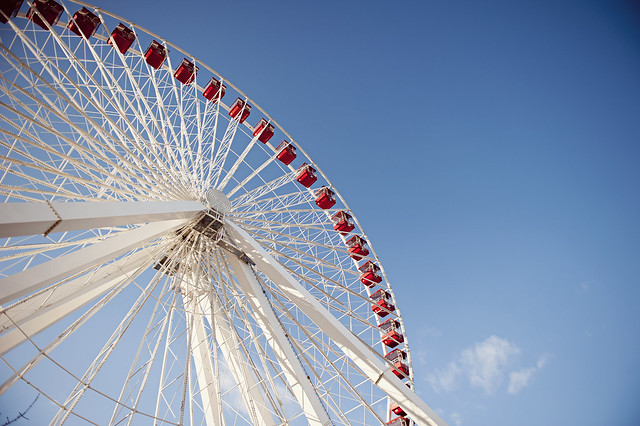
Associate nonfiction editor Alex Clark on today's bonus short: Michael Hurley’s “Why We Can’t,” part ashy montage and part cyclical musing on place, mimics its subject of a creaking Ferris wheel in sentence structure, cradles us in the shadowy alleys of Pittsburgh, and sets us up for the inevitable stomach drop of losing something we didn’t know we had in the first place.
Why We Can’t
George Ferris re-invented the wheel by stealing from Persians and making it bigger. He wanted to be a father, and fancied the notion of control through rewards; if you give them something, you can take it away. A good man, but giftless. And so: A slow, swinging ascent, not much to see here, all spokes and backs of heads, then suddenly the sky barely stitched-together, the hills way over there, the moon, Christ, can you see it, worn thin from our wonder, you could scratch it like a scab, you could push your thumbs through and peel it like an orange, you could tear it like bread. But instead, descent, you thumb the rubber chain at your waist, relax your legs’ press against the seat-floor, the tops of trees, the glowing fountain, the lights again, the line of people watching for your face, which is full of wisteria. So everything.
Wait, but younger, in a city so soaked with soot the windows turned to stone. A city you thumb in a thriftstore. Dairy-boy turned bridge-builder, he joined lands over rivers with other men and steel, longing for those achingPittsburgh girls, smoking rootlessly. It’s hard, here, to stay pretty; stockings ripped to ladders, a can of wine bruising their lips as they pass it around. Their cracked ankles tattooed. No one looks good drunk in daylight, but they were full of grace. Once he stood counting churchbells, caught one of their eyes and lost count. We can’t have it too long. He never had the courage to say “bridges” and “lands” and “full of grace,” and you’ll see how that goes.
So everything. Though the safety record, given the number of riders per year, is impeccable for a non-thrill ride, children routinely climb from the gondolas and fall to their deaths. It is a summer tradition, like saying goodbye and leaving. Parents ask for seatbelts, experts insist they won’t do anything. One man has named it the wiggle factor: Children don’t expect the ride to stop as passengers load and unload in the mechanical process below, panic, think they’re stuck, climb out of the belt, pull it clumsily over one shoe, then the other, then look over the side, too far, look too closely at the glowing fountain and lights below. Moths are an obvious metaphor. Frightened arms, Christ, flailing and smacking into spinning spokes. Twisting in the air like ribbon. You don’t forget seeing a thing like this.
At first from far, they thought the sky had caught fire. A round burn. This work can make you cruel; can make you research his life hoping to find he’d had a son that had fallen; not from a well-lit wheel, a boat or cliff would be fine. A train could be twisted to fit, a window or a well’s open mouth, trying to drink the sky. Because it would make a convenient parallel. You’d be surprised how many people wonder what the seats are called. Elsewhere, in Pittsburgh, and later: He never had his child. Died with his father and otherwise alone. His ashes went unclaimed, the urn turned to stone by the city by the dust by the lands he joined over rivers with steel and men and wheels. You give it so you can take it away. A glimpse and then it’s gone. So, everything. My sweet, my everything, my thank-god-for: This is why we can’t have nice things. Imagine what we’d do to them.
Michael Hurley is from Pittsburgh. His work has appeared in Sycamore Review, New Delta Review, Fourteen Hills, Spoon River Poetry Review, Mid-American Review, and is forthcoming in FIELD and Cimarron Review. His chapbook, Wooden Boys, is available from Seven Kitchens Press.


